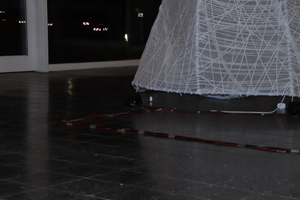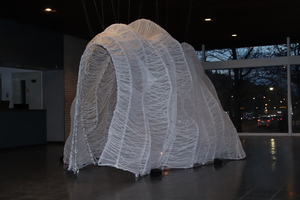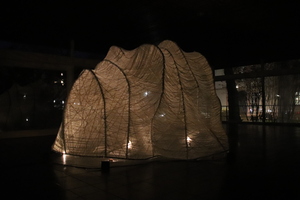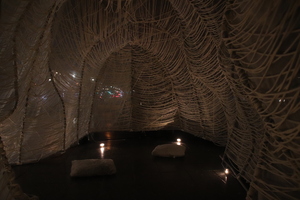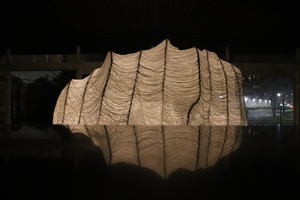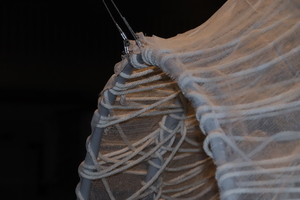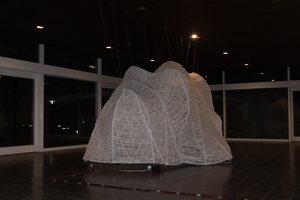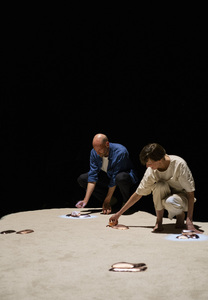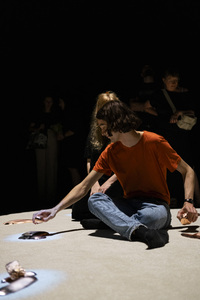"Installationsansicht"
| Begriff | Installationsansicht |
| Metakey | Beziehung/Funktion (media_object:relationship) |
| Typ | Keyword |
| Vokabular | Medienobjekt |
160 Inhalte
- Seite 1 von 14
Rauminstallation eternal girlhood
- Titel
- Rauminstallation eternal girlhood
- Schlagworte
- Datierung
- 06.07.24
- Titel
- Rauminstallation eternal girlhood
- Titel (en)
- Installation eternal girlhood
- Urheberrechtshinweis
- © Joanne Dietz
- Freigabe Nutzung HfG
- Medienersteller/in
- Beziehung/Funktion
- Medien-Beschreibung
- Ansicht der Installation im Chinesischen Pavillon (Forst BW) im Fasanengarten Karlsruhe.
Zu sehen: Fenster-Triptychon aus Mittelformat-Fotografien, Schreibmaschine, Girlhood Bibliothek, Baldachin mit tanzenden Spiegel-Schmetterlingen, Buch "eternal girlhood".
- Ansicht der Installation im Chinesischen Pavillon (Forst BW) im Fasanengarten Karlsruhe.
- Medien-Beschreibung (en)
- Installation at Chinese Pavillons (Forst BW) at Fasanengarten Karlsruhe.
In these pictures: window triptychon of medium format photographs, typewriter, girlhood library, canopy with dancing reflective butterflies, book "eternal girlhood".
- Installation at Chinese Pavillons (Forst BW) at Fasanengarten Karlsruhe.
- Abgebildete Personen
- Projektleiter/in
- Semester
- Studiengang
- Typ der Abschlussarbeit
- Importiert am
- 20.01.2025
- Übergeordnete Sets
- 1
Rauminstallation eternal girlhood am Tag der Eröffnung
- Titel
- Rauminstallation eternal girlhood am Tag der Eröffnung
- Datierung
- 05.07.24
- Titel
- Rauminstallation eternal girlhood am Tag der Eröffnung
- Titel (en)
- Installation eternal girlhood on the opening day
- Urheberrechtshinweis
- © Joanne Dietz
- Freigabe Nutzung HfG
- Medienersteller/in
- Beziehung/Funktion
- Medien-Beschreibung
- Rauminstallation mit Besucher*innen am Tag der Eröffnung.
- Rauminstallation mit Besucher*innen am Tag der Eröffnung.
- Medien-Beschreibung (en)
- Installation with visitors on the day of opening.
- Projektleiter/in
- Semester
- Studiengang
- Typ der Abschlussarbeit
- Importiert am
- 20.01.2025
- Übergeordnete Sets
- 1
Rauminstallation eternal girlhood am Tag der Eröffnung
- Titel
- Rauminstallation eternal girlhood am Tag der Eröffnung
- Datierung
- 05.07.24
- Titel
- Rauminstallation eternal girlhood am Tag der Eröffnung
- Titel (en)
- Installation eternal girlhood on the opening day
- Urheberrechtshinweis
- © Joanne Dietz
- Freigabe Nutzung HfG
- Medienersteller/in
- Beziehung/Funktion
- Medien-Beschreibung
- Rauminstallation mit Besucher*innen am Tag der Eröffnung.
- Rauminstallation mit Besucher*innen am Tag der Eröffnung.
- Medien-Beschreibung (en)
- Installation with visitors on the day of opening.
- Projektleiter/in
- Semester
- Studiengang
- Typ der Abschlussarbeit
- Importiert am
- 20.01.2025
- Übergeordnete Sets
- 1
She and her, white and white
- Titel
- She and her, white and white
- Autor/in
- Kategorie
- Titel
- She and her, white and white
- Urheberrechtshinweis
- © Jingruo Wang
- Rechtsschutz/Lizenz
- Freigabe Nutzung HfG
- Medienersteller/in
- Beziehung/Funktion
- Projektleiter/in
- Semester
- Studiengang
- Typ der Abschlussarbeit
- Importiert am
- 12.12.2024
- Übergeordnete Sets
- 1
She and her, white and white
- Titel
- She and her, white and white
- Autor/in
- Kategorie
- Titel
- She and her, white and white
- Urheberrechtshinweis
- © Jingruo Wang
- Rechtsschutz/Lizenz
- Freigabe Nutzung HfG
- Medienersteller/in
- Beziehung/Funktion
- Projektleiter/in
- Semester
- Studiengang
- Typ der Abschlussarbeit
- Importiert am
- 12.12.2024
- Übergeordnete Sets
- 1
She and her, white and white
- Titel
- She and her, white and white
- Autor/in
- Kategorie
- Titel
- She and her, white and white
- Urheberrechtshinweis
- © Jingruo Wang
- Rechtsschutz/Lizenz
- Freigabe Nutzung HfG
- Medienersteller/in
- Beziehung/Funktion
- Projektleiter/in
- Semester
- Studiengang
- Typ der Abschlussarbeit
- Importiert am
- 12.12.2024
- Übergeordnete Sets
- 1
She and her, white and white
- Titel
- She and her, white and white
- Autor/in
- Kategorie
- Schlagworte
- Titel
- She and her, white and white
- Urheberrechtshinweis
- © Jingruo Wang
- Rechtsschutz/Lizenz
- Freigabe Nutzung HfG
- Medienersteller/in
- Beziehung/Funktion
- Projektleiter/in
- Semester
- Studiengang
- Typ der Abschlussarbeit
- Importiert am
- 12.12.2024
- Übergeordnete Sets
- 1
She and her, white and white
- Titel
- She and her, white and white
- Autor/in
- Kategorie
- Titel
- She and her, white and white
- Urheberrechtshinweis
- © Jingruo Wang
- Rechtsschutz/Lizenz
- Freigabe Nutzung HfG
- Medienersteller/in
- Beziehung/Funktion
- Projektleiter/in
- Semester
- Studiengang
- Typ der Abschlussarbeit
- Importiert am
- 12.12.2024
- Übergeordnete Sets
- 1
She and her, white and white
- Titel
- She and her, white and white
- Autor/in
- Kategorie
- Schlagworte
- Titel
- She and her, white and white
- Urheberrechtshinweis
- © Jingruo Wang
- Rechtsschutz/Lizenz
- Freigabe Nutzung HfG
- Medienersteller/in
- Beziehung/Funktion
- Projektleiter/in
- Semester
- Studiengang
- Typ der Abschlussarbeit
- Importiert am
- 12.12.2024
- Übergeordnete Sets
- 1
She and her, white and white
- Titel
- She and her, white and white
- Autor/in
- Kategorie
- Titel
- She and her, white and white
- Urheberrechtshinweis
- © Jingruo Wang
- Rechtsschutz/Lizenz
- Freigabe Nutzung HfG
- Medienersteller/in
- Beziehung/Funktion
- Projektleiter/in
- Semester
- Studiengang
- Typ der Abschlussarbeit
- Importiert am
- 12.12.2024
- Übergeordnete Sets
- 1
finding traces and placing connections - in use
- Titel
- finding traces and placing connections - in use
- Autor/in
- Schlagworte
- Titel
- finding traces and placing connections - in use
- Urheberrechtshinweis
- © Sören Göbel
- Freigabe Nutzung HfG
- Medienersteller/in
- Beziehung/Funktion
- Abgebildete Personen
- Projektleiter/in
- Semester
- Studiengang
- Typ der Abschlussarbeit
- Importiert am
- 20.01.2025
- Übergeordnete Sets
- 1
finding traces and placing connections - in use
- Titel
- finding traces and placing connections - in use
- Autor/in
- Schlagworte
- Titel
- finding traces and placing connections - in use
- Urheberrechtshinweis
- © Sören Göbel
- Freigabe Nutzung HfG
- Medienersteller/in
- Beziehung/Funktion
- Abgebildete Personen
- Projektleiter/in
- Semester
- Studiengang
- Typ der Abschlussarbeit
- Importiert am
- 20.01.2025
- Übergeordnete Sets
- 1



